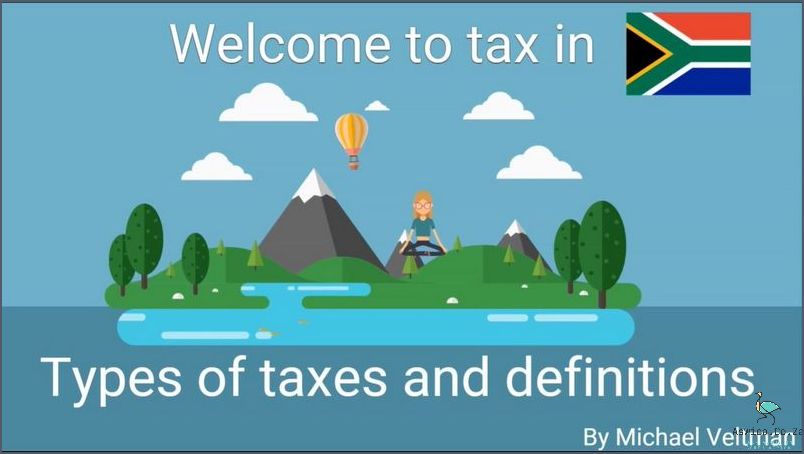
In South Africa, all individuals and companies are required to pay taxes in order to support the functioning of the government. Taxes are a compulsory contribution to the state, and are used to fund various public services such as healthcare, education, public transportation, and infrastructure. The South African Revenue Service (SARS) is responsible for the collection of taxes, and is responsible for regulating the taxation system in the country.
Individuals and companies in South Africa are subject to income tax, which is a tax on the money earned from employment, investments, and other sources. In addition to income tax, individuals must also pay Value-Added Tax (VAT) on goods and services purchased, and Capital Gains Tax (CGT) on the profits made from selling assets. Companies must also pay Corporate Income Tax (CIT) on their profits and are also liable for turnover taxes and other levies.
Taxes are essential for the growth and development of any country and South Africa is no exception. By paying taxes, individuals and companies are contributing to the welfare of the nation and helping to build a better future for all South Africans.
Contents
Who Pay Taxes In South Africa
In South Africa, taxation is administered by the South African Revenue Service (SARS). Taxpayers in South Africa include individuals, companies, and trusts, as well as foreign nationals living and working in the country. Individuals must pay taxes on their income, while companies must pay taxes on their profits. Trusts are subject to taxation on the income generated by their assets. In addition to income taxes, South Africans are also subject to value-added tax (VAT), as well as capital gains tax, estate duty and other taxes. Foreign nationals living and working in South Africa are subject to the same taxes as South Africans, although they may be eligible for certain deductions. All South African citizens are expected to comply with the tax laws of the country and failure to do so can result in heavy fines and even criminal prosecution.
Types of Taxes in South Africa

Taxes are an unavoidable part of life, and South Africa is no exception. There are various types of taxes in South Africa, and understanding them can help individuals and businesses alike to more effectively plan for and manage their finances. In this blog, we will explore the different types of taxes in South Africa and who is liable for them.
The primary taxes in South Africa are income tax, value-added tax (VAT), and customs duties. Income tax is paid by individuals and businesses based on their income, and is collected by the South African Revenue Service (SARS). VAT is a consumption tax that is charged on the sale of goods and services, and is also collected by SARS. Customs duties are taxes that are paid on goods imported into South Africa, and are collected by the South African Customs Union.
In addition to the primary taxes mentioned above, South Africa also has some secondary taxes. These include transfer duty, which is paid on the transfer of property; capital gains tax, which is charged on profits made from the sale of assets; and estate duty, which is charged on the transfer of assets following the death of an individual. Additionally, South Africa also has levies and fees that must be paid to obtain certain services or licenses, such as license fees for radio and television broadcasting.
Who is liable for the various taxes in South Africa? Generally speaking, individuals are liable for income tax, transfer duty, capital gains tax, and estate duty. Businesses are liable for income tax, VAT, and customs duties. Additionally, both individuals and businesses may be liable for levies and fees, depending on the service or license they are obtaining.
It is important to understand the different types of taxes in South Africa and who is liable for them. Doing so can help individuals and businesses to more effectively plan for and manage their finances, and to ensure that they are compliant with the tax laws of South Africa.
Who Pays Taxes in South Africa
Taxes are an important part of life in South Africa, and it is important to understand who is responsible for paying them. The South African government has implemented a range of taxes, which vary depending on the individual or company who is liable to pay them.

Individuals who live and work in South Africa are responsible for paying income tax. This is based on an individual’s taxable income and is determined by the South African Revenue Service (SARS). All forms of income are included in this, from salaries and wages to investments and rental income.
Companies incorporated in South Africa must also pay taxes. The two main types of taxes that companies must pay are corporate income tax (CIT) and value-added tax (VAT). CIT is a tax on the profits of a company, while VAT is a tax on the sale of goods and services.
Other taxes in South Africa include capital gains tax, transfer duty, and estate duty. Capital gains tax is a tax on the gain made from the sale of assets, while transfer duty is a tax on the transfer of property. Estate duty is a tax paid when someone dies and leaves property to another person.
In addition to taxes on individuals and companies, South Africa also levies taxes on consumption. These include fuel levies, excise duties, and customs duties. Fuel levies are taxes on petrol and diesel, while excise duties are taxes on certain products, such as alcohol and tobacco. Customs duties are taxes on imports and exports.
Overall, understanding who pays taxes in South Africa is important for businesses and individuals alike. Taxes are an important source of revenue for the government and help to fund public services and infrastructure. By understanding who is liable for paying taxes, businesses and individuals can ensure that they meet their tax obligations and remain compliant with the law.
Benefits of Paying Taxes in South Africa
Taxes are an essential part of life in South Africa, and paying taxes can provide a range of benefits for citizens and businesses alike. From providing essential services such as healthcare, education, and infrastructure to helping to create economic stability, paying taxes in South Africa is a necessary task that can help to create a better future. Here are some of the main benefits of paying taxes in South Africa.

1. Funding for Essential Services:
The primary benefit of paying taxes in South Africa is that the money collected is used to fund essential services that benefit all citizens. This includes healthcare, education, infrastructure, and other government services. Tax money helps to fund these services and ensures that everyone in the country has access to basic needs.
2. Stimulate the Economy:
Paying taxes in South Africa also helps to stimulate the economy and create jobs. The money collected is used to invest in public projects, which helps to create jobs and boost the economy. This in turn helps to create economic stability, which is essential for long-term growth and prosperity.
3. Promote Social Equity:
Paying taxes in South Africa also helps to promote social equity. Taxes are used to fund public projects which help to reduce inequality and ensure that everyone in the country has access to the same opportunities and resources. This helps to create a more fair and just society, which is beneficial for everyone involved.
4. Generate Revenue for the Government:
Finally, paying taxes in South Africa helps to generate revenue for the government. This revenue is used to fund public projects and services, as well as to pay for the salaries of government employees. Without this revenue, the government would be unable to provide essential services for its citizens.
Paying taxes in South Africa is an important task, and it can provide a range of benefits for citizens and businesses alike. From providing essential services to stimulating the economy, paying taxes can help create a better future for everyone.
Conclusion
In conclusion, it is clear that a variety of individuals and businesses pay taxes in South Africa. Individuals are subjected to personal income tax, whereas businesses are subject to corporate income tax, value-added tax, and other taxes. Additionally, employers must pay the withholding tax on behalf of their employees. The taxes collected in South Africa are used to fund public programs such as education, healthcare, and infrastructure. Therefore, it is important for all citizens to understand the taxes they are required to pay and comply with the regulations to ensure that public services continue to be funded.



